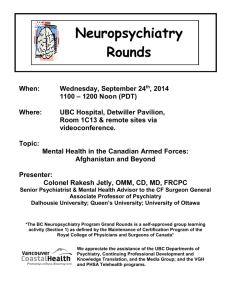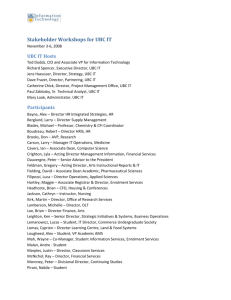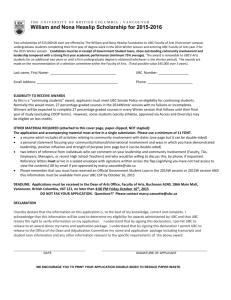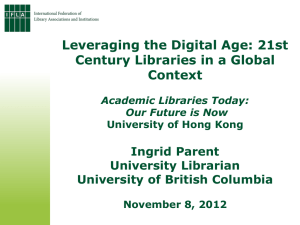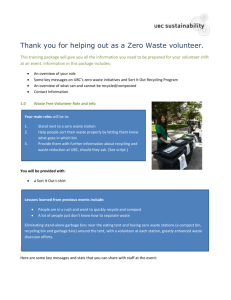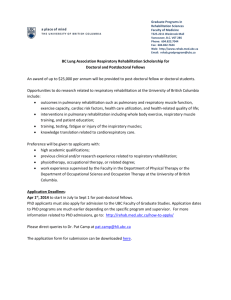MHNA Application Form 2013 - UBC Mental Health Awareness Club
advertisement
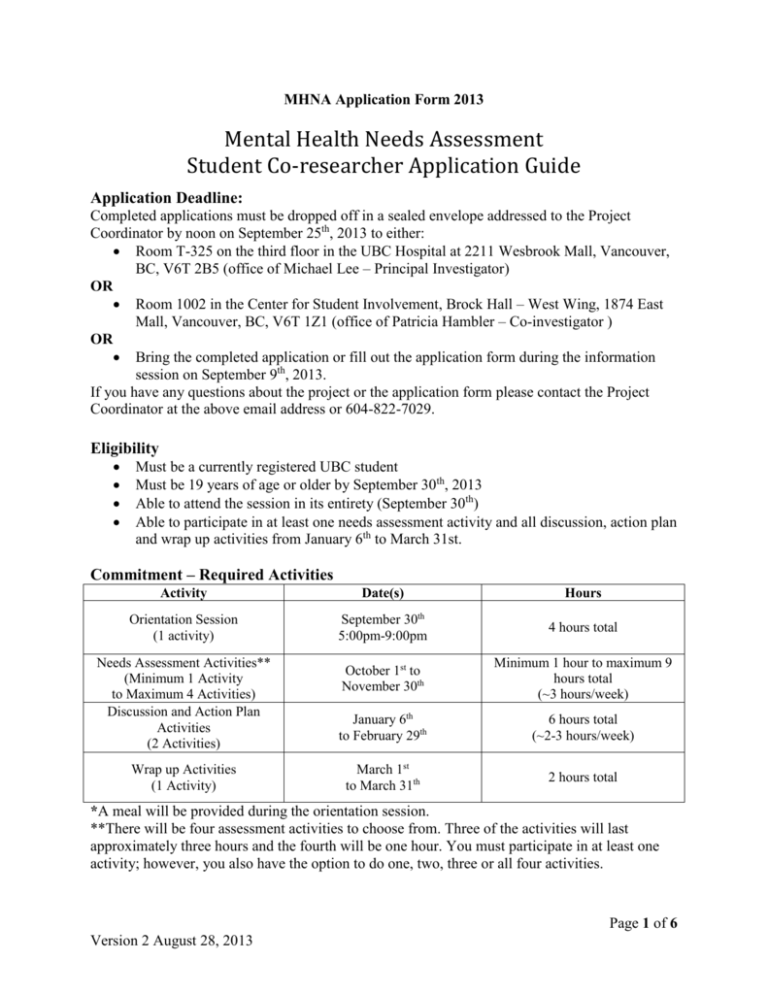
MHNA Application Form 2013 Mental Health Needs Assessment Student Co-researcher Application Guide Application Deadline: Completed applications must be dropped off in a sealed envelope addressed to the Project Coordinator by noon on September 25th, 2013 to either: Room T-325 on the third floor in the UBC Hospital at 2211 Wesbrook Mall, Vancouver, BC, V6T 2B5 (office of Michael Lee – Principal Investigator) OR Room 1002 in the Center for Student Involvement, Brock Hall – West Wing, 1874 East Mall, Vancouver, BC, V6T 1Z1 (office of Patricia Hambler – Co-investigator ) OR Bring the completed application or fill out the application form during the information session on September 9th, 2013. If you have any questions about the project or the application form please contact the Project Coordinator at the above email address or 604-822-7029. Eligibility Must be a currently registered UBC student Must be 19 years of age or older by September 30th, 2013 Able to attend the session in its entirety (September 30th) Able to participate in at least one needs assessment activity and all discussion, action plan and wrap up activities from January 6th to March 31st. Commitment – Required Activities Activity Date(s) Hours Orientation Session (1 activity) September 30th 5:00pm-9:00pm 4 hours total Needs Assessment Activities** (Minimum 1 Activity to Maximum 4 Activities) Discussion and Action Plan Activities (2 Activities) October 1st to November 30th Minimum 1 hour to maximum 9 hours total (~3 hours/week) January 6th to February 29th 6 hours total (~2-3 hours/week) March 1st to March 31th 2 hours total Wrap up Activities (1 Activity) *A meal will be provided during the orientation session. **There will be four assessment activities to choose from. Three of the activities will last approximately three hours and the fourth will be one hour. You must participate in at least one activity; however, you also have the option to do one, two, three or all four activities. Page 1 of 6 Version 2 August 28, 2013 Accordingly, your commitment during the Needs Assessment Activities can range from 1 hour to 9 hours depending on the type and number of activities you choose. What is the purpose of the UBC Mental Health Needs Assessment (MHNA) project? As student mental health is a growing concern across campuses in North America it is imperative the institution understands the causes of mental health stigma from a student perspective to be able to develop and support anti-stigma efforts and student mental health and wellbeing (Eisenberg, Downs, Golberstein, & Zivins, 2009). Accordingly, the purpose of the UBC Mental Health Needs Assessment is to learn about and better understand UBC students’ perspectives of mental health stigma and the impact it has on student life. The project will take place on the UBC Vancouver campus and will use a participatory action research approach. The project is being overseen by the Mental Health Awareness Club (MHAC) as well as its Advisory Circle, which is comprised of faculty and staff members. The Club is student led with a mandate to increase mental health awareness and promotion and specifically in this project to better understand the needs and capacity of UBC students. You are being asked to participate in this project because you have a valuable perspective, insight and knowledge as to how mental health stigma affects student life and what enables and inhibits students from achieving academic success and other student-related achievements. What is participatory action research (PAR), why is it important, and what is my role as a student co-researcher? Participatory action research is an approach or philosophy that guides the knowledge generation process. One of the main principles of PAR includes involving all individuals (e.g., students, Principal Investigator, faculty and staff) as equitable partners who share power and individual expertise (Israel et al., 1998; Israel, Eng, Schulz, & Parker, 2005). This allows for co-learning and capacity building for everyone involved. The approach is also committed to acting on the findings or themes identified in a timely manner such that sustainable change can occur to foster the creation of a campus that is free from mental health stigma. A student co-researcher is a UBC student who fulfills the eligibility requirements and volunteers his or her time to contribute to making UBC a healthier campus community by increasing mental health awareness. Additionally, a student co-researcher, as outlined by the PAR principles, shares power equitably with all partners in the project and strives to identify the capacity and needs of the UBC campus with regards to creating a supportive and stigma free learning environment that will ensure equal access for all learners. The student co-researcher is critical in providing expertise and knowledge as to how he or she conceptualizes mental health stigma affecting student success. Who should participate in the MHNA and what are the potential benefits? In addition to fulfilling the eligibility criteria described above, students who are interested in sharing their perspectives as a student at UBC as well as learning about others’ in a respectful and comfortable environment are invited to apply. Additionally, students who strive to demonstrate maturity, empathy, reliability, conscientiousness, compassion and appreciation of diverse lifestyles and points of view are invited to apply. Page 2 of 6 Version 2 August 28, 2013 The potential benefits of being involved in this project include improved individual awareness and increased knowledge about mental health and wellness. There is an opportunity to contribute to the promotion of mental health awareness and knowledge across the UBC campus community. As well as the opportunity for the development of professionalism and research skills, project work, health promotion, leadership and facilitation skills. There will also be compensation for student co-researchers. Student co-researchers who participate in the orientation session, at least one needs assessment activity and all discussion, action plan and wrap up activities will receive an honorarium of a $20 gift certificate; while those who attend between 99- 80% of the activities described above will receive an honorarium of a $15 gift certificate. For example, if a student co-researcher attends the orientation, performs at least one needs assessment activity, and attends the action plan and wrap up activity but misses the discussion activity, he or she will receive an honorarium gift certificate of $15 instead of $20. I don’t have any research experience. Can I still apply? Absolutely! There is no requirement for previous research experience or knowledge. The relevant information will be provided during the orientation session. Are the hours flexible? What if I can only make it to part of the orientation and training sessions? The orientation session must be completed in its entirety. As per the eligibility requirements of the project students must be able to attend the session. The four assessment activities, discussion, action plan and wrap up activities will be scheduled based on the schedule and availability of the student co-researchers. You must participate in at least one of the assessment activities; however, you may choose to participate in one, two, three or all four depending on your preferences and available time. What are the four methods available to participate in? The four methods available to participate in this project include: 1) focus groups or as we like to refer to them “research parties” (~2 hours commitment) – will be held to invite you to share, in a group setting, about your perspectives of mental health stigma as a UBC student. These activities will be facilitated by a qualified, skilled facilitator. 2) individual interviews (~1 hour commitment) – alternatively if you prefer to disclose information in a private setting individual interviews are also available and will be conducted one-on-one with a qualified, skilled interviewer. The questions will be the same in the focus group and individual interviews. You have the option to participate in both the research parties and individual interviews and contribute additional perspective and knowledge each time. 3) Photovoice (~3 hours commitment) – if you prefer to express your perspective in a different manner or an additional manner you are welcome to participate in the Photovoice activities. Photovoice involves taking between 10 to 20 pictures of places or objects that represent your Page 3 of 6 Version 2 August 28, 2013 perspective of stress as a UBC student. After submitting the pictures to the Project Coordinator the group will participate in an activity to identify the major themes in the pictures. 4) art activities (~3 hours commitment) – if you prefer to paint your perspectives of mental health stigma as a UBC student there will be an opportunity to participate in art activities. How will the applications be reviewed and when will I know if I have been offered a student co-researcher position? Applications will be received starting on September 3rd, 2013 until September 25th, 2013 at noon. An information session will be held on Monday September 9th, 2013 from 5:00pm to 7:00pm at the Centre for Student Involvement and Careers at Brock Hall to provide an overview of the project, to answer any questions and to provide other opportunities for campus involvement. The two information sessions will be identical. Other opportunities to volunteer and engage in mental health-related initiatives and projects on campus will be presented during these information sessions (e.g., Bell Youth Mental Health IMPACT project, Kaleidoscope, Healthy Minds – Thrive Week). Based on the eligibility requirements, 50 student co-researchers will be selected to participate in the project and will be notified by email on September 27th, 2013. Please check your junk or spam folder to ensure all emails from mhna.ubc@gmail.com are being received in your inbox. Thank you for taking the time to read this document and to fill out the application form. If you have any questions you can contact the Project Coordinator at mhna.ubc@gmail.com or 604822-7029. Page 4 of 6 Version 2 August 28, 2013 Mental Health Needs Assessment Student Co-researcher Application Form Please complete the following application to the best of your comfort and ability. All applications will be kept strictly confidential. Personal Information Name: ____________________________________ Age: __________ Sex: ________ Faculty: __________________________________Program: ____________________________ Year of Study: ____________________________________ Contact Information Email: ___________________________________ Phone: ___________________________________ General Information 1) How did you hear about the Mental Health Needs Assessment project (please check all that apply): Career Services Website Mental Health Awareness Club Website AMS Volunteer Connect Website Clubs Days Imagine Day Information Session Poster Student Co-researcher Friend Other (please specify): ______________________________________ 2) I have read the Student Co-researcher Application Guide carefully (please check one): Yes No Page 5 of 6 Version 2 August 28, 2013 Commitment 1) Please write down the major reason(s) you would like to participate in the UBC Mental Health Needs Assessment project? Based upon the above reflections please answer the following questions considering your potential ability to commitment to the project. 2) Are you able to attend the orientation session in its entirety – September 30th, 2013 from 5:00pm to 9:00pm (please check one): Yes No 3) Are you able to commit to all of the activities required as outlined in Student Co-researcher Application Guide from September 30th, 2013 to March 31st, 2014 inclusive (please check one): Yes No Page 6 of 6 Version 2 August 28, 2013

